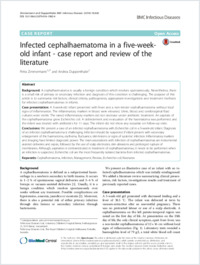Infected cephalhaematoma in a five-week-old infant - case report and review of the literature
- Zimmermann, Petra Infectious Diseases Unit, University Children’s Hospital Berne, Switzerland - Infectious Diseases Unit, The Royal Children’s Hospital Melbourne, Parkville, Australia - Department of Medicine, University of Fribourg, Switzerland
- Duppenthaler, Andrea Infectious Diseases Unit, University Children’s Hospital Berne, Switzerland
-
04.11.2016
Published in:
- BMC Infectious Diseases. - 2016, vol. 16, no. 1, p. 636
English
A cephalhaematoma is usually a benign condition which resolves spontaneously. Nevertheless, there is a small risk of primary or secondary infection and diagnosis of this condition is challenging. The purpose of this article is to summarise risk factors, clinical criteria, pathogenesis, appropriate investigations and treatment methods for infected cephalhaematomas in infants.Case presentation: A 5-week-old infant presented with fever and a non-tender cephalhaematoma without local signs of inflammation. The inflammatory markers in blood were elevated. Urine, blood and cerebrospinal fluid cultures were sterile. The raised inflammatory markers did not decrease under antibiotic treatment. An aspirate of the cephalhaematoma grew Escherichia coli. A debridement and evacuation of the haematoma was performed and the infant was treated with antibiotics for 11 days. The infant did not show any sequelae on follow-up visits.Conclusions: We present a case of an infected cephalhaematoma with Escherichia coli in a 5-week-old infant. Diagnosis of an infected cephalhaematoma is challenging. Infection should be suspected if infant present with secondary enlargement of the haematoma, erythema, fluctuance, skin lesions or signs of systemic infection. Inflammatory markers and imaging have limited diagnostic power. The main associations with infection of cephalhaematomas are instrumental assisted deliveries and sepsis, followed by the use of scalp electrodes, skin abrasions and prolonged rupture of membranes. Although, aspiration is contraindicated in treatment of cephalhaematomas, it needs to be performed when an infection is suspected. Escherichia coli are the most frequently isolated bacteria from infected cephalhaematomas.
- Faculty
- Faculté des sciences et de médecine
- Department
- Master en médecine
- Language
-
- English
- Classification
- Biological sciences
- License
-
License undefined
- Identifiers
-
- RERO DOC 328058
- DOI 10.1186/s12879-016-1982-4
- Persistent URL
- https://folia.unifr.ch/unifr/documents/308421
Statistics
Document views: 125
File downloads:
- pdf: 166
